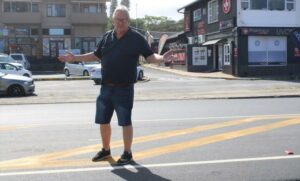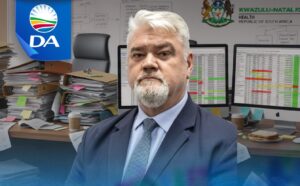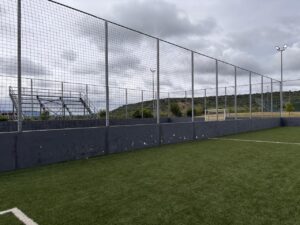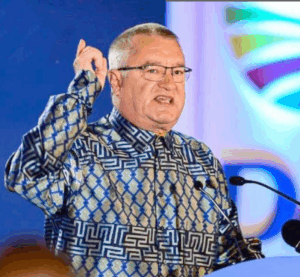(The following debate was delivered during a Sitting of the KZN Legislature held on 25 November)
Today, the KwaZulu-Natal (KZN) Legislature acknowledges the opening of Phase One of the N3 upgrade between Pietermaritzburg and Durban, a significant milestone for our province. The R6.8 billion investment, forming part of a broader R33 billion upgrade across 15 transport corridors, is an important step toward modernising KZN’s economy, improving logistics reliability and positioning our province as a gateway of opportunity.
The Democratic Alliance (DA) supports progress, development and infrastructure investment that is transparent, strategic and beneficial to our communities. It is, however, essential that the constitutional separation of powers between national, provincial and local government is upheld. The upgrade of the N3 and N2 are SANRAL projects and while it is appropriate to welcome and support KZN infrastructure improvements, KZN’s government departments must guard against a growing trend of attempting to claim credit for work outside their functional mandate.
The DA fully supports large-scale infrastructure projects such as the N3 upgrade, they underpin economic growth. And while national government builds highways, KZN’s Department of Transport (DoT) must fix roads used by our people every day. If we want investors to put their money into KZN, industries to expand, tourism to thrive, agriculture to reach markets and job creation then we need reliable provincial and district roads – not just impressive national freeways.
Investor confidence does not begin and end with the N3. It includes roads leading to industrial parks, farms, rural towns, ports, business hubs and tourist destinations. And – right now – too many of those roads are collapsing. SANRAL may be delivering on the N3, but KZN’s DoT is not delivering on the R69, the R74, the P130, the R102, and countless more. KZN cannot build a world-class economy on a collapsing secondary road network.
The DA must also caution the DoT against attempting to use SANRAL’s achievements to mask its own failures. Celebrating the SANRAL-led N3 upgrade, while ignoring the dire state of provincial roads is like polishing the front gate while the house falls down behind it. This is a daily reality for many KZN residents and includes damaged vehicles, dangerous potholes, isolated rural communities, unfinished contractor work and schoolchildren risking their lives on unsafe roads and bridges. No amount of ribbon-cutting on SANRAL projects can hide the fact that our provincial road network is in crisis.
The DA, as a partner within KZN’s Government of Provincial Unity (GPU), is not here to score cheap political points – we are here to govern responsibly. We support SANRAL’s work and we commend Transport MEC, Siboniso Duma for engaging with national infrastructure developments. But we insist that he and his department focus on their own mandate: maintaining, repairing and upgrading roads that fall squarely under their jurisdiction. Because unity is not pretending everything is perfect – it is working together and delivering on the needs of our people.
While we celebrate the N3 progress, we cannot ignore the daily reality facing thousands of residents living far from these flagship projects. For these communities, road infrastructure is not a story of progress – it is a story of crisis. Across KZN, they are confronted by:
• Collapsing provincial roads
The R74 between Colenso and Bergville which has deteriorated to the point where buses, ambulances and learner transport are forced to take dangerous alternative routes
The P176 in Phoenix, the P130 in Tongaat, the R102 in Umdloti and large sections of KZN’s South Coast roads which remain neglected despite repeated commitments by the DoT
Rural areas such as uMkhanyakude, uMzinyathi and Harry Gwala where roads are unsafe, with communities cut off during bad weather and where emergency services cannot access remote villages and;
The R69 between Vryheid to Pongola which has become emblematic of neglect, with local reporting indicating more than 500 potholes in one kilometre. According to community voices, vehicles are being damaged, chassis are broken and tyres are blown while there have been head-on collisions due to the combination of misty weather and dangerous road conditions. For residents, this road is not an inconvenience, it is a safety crisis which sees them forced to risk their lives, or pay dearly in repairs, every time they travel.
More than R17billion in road maintenance backlogs
The DoT acknowledges a maintenance crisis, yet year after year, there is under-expenditure, delays in procurement and projects that are stalled due to administrative bottlenecks. Shockingly, 30 contractors awarded KZN road tenders have failed to deliver, resulting in a R4.6billion cost to the province when it comes to incomplete or abandoned works. While MEC Duma has acknowledged this and promised punitive measures for those contractors, this scale of failure raises serious governance concerns about procurement, oversight, and consequence management. The effect is that entire projects never get off the ground, communities wait, roads remain unsafe and the public purse is drained
A massive pothole backlog of 3.12 million m² with a big part of the crisis stemming from poor workmanship. These potholes are not trivial, they cause serious vehicle damage
The 2022 floods devastated parts of KZN, destroying roads and bridges in rural areas. According to the DoT’s own performance plan, many roads and bridges in deep rural locations remain damaged or eroded, limiting access to schools, clinics and economic centres
KZN’s failing road infrastructure is derailing our fragile economic recovery with small towns dependent on tourism, agriculture and logistics hardest hit. Bad roads discourage tourists, raise farmers’ transport costs and isolate communities. Poor roads are not just a service-delivery issue, they are an economic development emergency.
Poor communication and accountability
Public representatives and residents write letters, send emails, make calls, and raise concerns about failing roads but officials do not respond. There is no feedback, no clear timelines and no transparent project tracking. Communities are left in the dark while roads collapse around them.
• Internal instability
KZN’s DoT continues to face vacancies in engineering and technical posts, inconsistent supply chain processes and contractors who abandon sites without consequence. This undermines service delivery and erode public trust.
KZN’s GPU is built on the principles of cooperation, transparency, and shared responsibility. But unity cannot become an excuse for complacency. While the GPU must support the MEC where progress is made, it must also hold the DoT accountable when it fails our people – that balance is what responsible governance looks like.
The DA commends MEC Duma for the leadership shown in advancing large-scale infrastructure such as the N3 upgrade and for efforts to use transport infrastructure as a catalyst for unity and economic growth. But this unity must extend beyond ribbon cuttings and national highways. It must be felt in rural gravel roads, in township access routes, in pothole-ridden urban roads and in communities where children walk dangerously long distances because learner transport cannot reach them. If we are serious about unity, we must be serious about equitable development.
The DA governs municipalities and provinces where we have demonstrated that good governance delivers real results. This includes:
• Transparent Road Maintenance Dashboards
In the DA-led Western Cape, residents can track road projects online, updated regularly. KZN must replicate this with every road project, tender stage, contractor details, budget spent vs budget allocated and expected completion date available online to eliminate confusion, improve accountability and prevent contractors from hiding behind silence.
• Professionalising the DoT
Vacancies in engineering and technical roles must be filled urgently, based on merit, not political considerations. The DA has consistently shown how a professionalised civil service accelerates delivery
• Community Reporting System
KZN needs a central hotline and digital platform, similar to DA-run municipalities, where residents can report road issues, upload photos and receive reference numbers with turnaround commitments
• Consequence Management for Failing Contractors
Contractors who abandon sites or deliver substandard work must be blacklisted. In addition, there must be strict monitoring, penalties for non-performance and increased use of performance guarantees.
• Fast-track Procurement for Emergency Repairs
KZN’s DoT must create a standing panel of pre-approved contractors for emergency repairs to cut turnaround times from months to days.
The DA supports the call for all KZN’s people to stand together in building a prosperous province. But standing together cannot mean standing still. Our people need action, they need functioning roads, they need predictable infrastructure planning and they need a DoT that communicates, responds, and delivers. The N3 upgrade is a milestone, but it cannot be the only milestone we celebrate this decade. Progress must flow outward from major corridors to every KZN community.
The DA supports the KZN Legislature’s resolution to commend MEC Duma for progress made and we support the call for unity in building our province. But unity requires honesty, transparency and commitment to delivering services – not just when the cameras roll, but where communities cry out for help. The DA stands ready, constructively, responsibly and collaboratively to work with the MEC and his department to turn KZN’s transport network into one that truly serves its people. Let us be united in purpose, firm in accountability, and committed to a future where every citizen can say KZN is moving forward.







